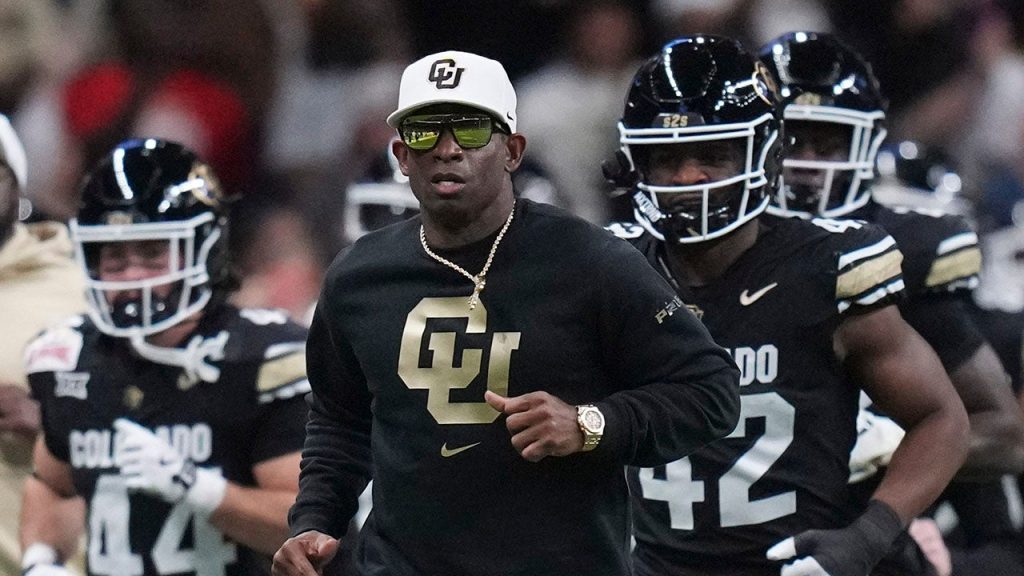The BYU Cougars concluded their 2023 season with a resounding victory against the Colorado Buffaloes in the Alamo Bowl, securing an impressive 11-2 record and marking their third 10-win season in the past five years. This achievement reflects a significant resurgence for the program, reminiscent of their consistent success in the mid-2000s. The dominant 36-14 win over Colorado, a team brimming with NFL-bound talent and led by the charismatic Deion Sanders, solidified BYU’s position as a force to be reckoned with in college football.
The game itself became a focal point of discussion not only for the on-field action but also for the perceived bias in the ESPN broadcast coverage. While Colorado, with their high-profile players like Shedeur Sanders and Travis Hunter, and the media attention surrounding Deion Sanders’ program rebuild, commanded significant airtime, BYU’s performance seemed to be overshadowed. This imbalance prompted BYU offensive lineman Connor Pay to directly address the broadcasters, urging them to acknowledge the Cougars’ contributions to the game. This plea resonated with BYU fans and sparked a wider conversation about balanced reporting in sports broadcasting. The incident highlighted the tension between showcasing individual star power and recognizing the collective effort of a team, particularly in a prominent bowl game.
The Cougars’ offensive prowess was on full display in the Alamo Bowl, with running back L.J. Martin leading the charge. Martin’s two touchdowns and 93 rushing yards, complemented by Sione I Moa’s additional rushing touchdown, propelled BYU to a commanding lead. This strong ground game, combined with a solid defensive performance that effectively contained Colorado’s offensive threats, showcased the team’s balanced approach and underscored their deserved victory. The win became even more significant considering Colorado’s projected NFL prospects, reinforcing BYU’s ability to compete against top-tier talent.
The victory over Colorado served as a fitting culmination to a remarkable turnaround season for BYU under head coach Kalani Sitake. Following a challenging first season in the Big 12 Conference, which yielded only five wins, Sitake rallied his team to an 11-win season and a prominent bowl game appearance. This impressive turnaround speaks volumes about Sitake’s leadership and the team’s resilience. His 5-2 record in bowl games since taking the helm in 2016 further solidifies his reputation as a coach capable of guiding his team to success on the biggest stages.
The contrasting narratives surrounding the two teams added another layer of intrigue to the Alamo Bowl matchup. While Colorado garnered significant attention due to the star power of Shedeur Sanders, Travis Hunter, and their coach Deion Sanders, BYU quietly built a strong season, culminating in a dominant bowl game performance. The media’s focus on Colorado, while understandable given the hype surrounding the program, inadvertently created a David versus Goliath narrative, with BYU embracing the underdog role. The Cougars ultimately proved that their on-field performance deserved equal recognition, highlighting the importance of acknowledging the collective team effort alongside individual brilliance.
The Alamo Bowl victory not only provided a satisfying end to BYU’s season but also set a positive tone for the future. The team’s ability to overcome adversity, their consistent performance throughout the season, and their dominant bowl game win demonstrate the program’s upward trajectory. With a strong foundation in place and a proven coach at the helm, BYU is poised to continue competing at a high level in the Big 12 Conference and beyond. The experience gained from this season, particularly the challenges and triumphs, will undoubtedly serve as valuable lessons for returning players and inspire future generations of Cougars.

